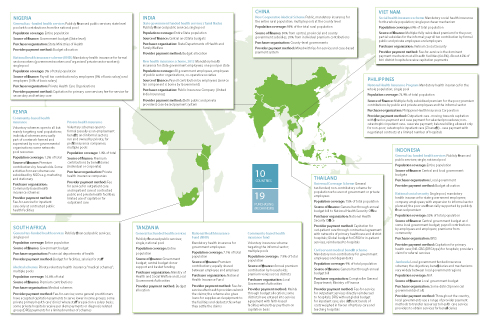Overview
In healthcare financing, purchasing refers to the transfer of pooled resources to health care providers on behalf of the population in exchange for health services and involves three key decisions: identification of the interventions or services to be purchased (the benefit package); selection of providers from whom services will be purchased; and determination of how these services will be purchased. Core to the decision-making process is ensuring that all services are available, accessible and of high quality.
This research project critically assessed how selected purchasing mechanisms performed in a range of low and middle-income countries from the strategic purchasing perspective and identified factors influencing that performance. The countries included in the study are: Kenya, India, Nigeria, South Africa, Tanzania, Thailand and Vietnam.
The research examined the relationships between purchasers and other groups of actors involved in purchasing mechanisms, including the government, healthcare providers and citizens, so as to understand the various components of strategic purchasing and the organizational environment within which it operates.
The profiles of the purchasing mechanisms examined in the study are shown on the map below (click on the map for larger version).
Key findings
Purchasing is the critical link between resources mobilised for UHC and the effective delivery of quality services; however, of all the country research studies, only the National Health Security Office (purchaser for Thailand’s Universal Coverage Scheme) exhibits qualities of strategic purchasing, which has enabled it to provide healthcare coverage and financial protection to the whole population at a low cost.
A strategic purchaser requires the following features: strong governance with a mandate to provide access to health services; a multi-stakeholder governing board that effectively brings together the government, citizens and healthcare providers and ensures accountability between them; institutional capacity (of the purchaser) to secure an adequate budget and the power to negotiate lower prices for medicines.
Publications
 Purchasing project summary
Purchasing project summary Topic overview: What is strategic purchasing for health?
Topic overview: What is strategic purchasing for health? Purchasing factsheet
Purchasing factsheet  More about the RESYST - APO collaboration
More about the RESYST - APO collaboration
Policy briefs on strategic purchasing for Universal Health Coverage
 Medical Schemes in South Africa
Medical Schemes in South Africa The South African Integrated Public System
The South African Integrated Public System The Nigerian Formal Sector Social Health Insurance Programme
The Nigerian Formal Sector Social Health Insurance Programme The Public Integrated Health System in Enugu State, Nigeria
The Public Integrated Health System in Enugu State, Nigeria Community-based Health Insurance Schemes in Kenya
Community-based Health Insurance Schemes in Kenya Private Health Insurance firms in Kenya
Private Health Insurance firms in Kenya Universal Coverage Scheme and Civil Servant Medical Benefit Scheme in Thailand
Universal Coverage Scheme and Civil Servant Medical Benefit Scheme in Thailand The Social Health Insurance fund in Vietnam
The Social Health Insurance fund in Vietnam


